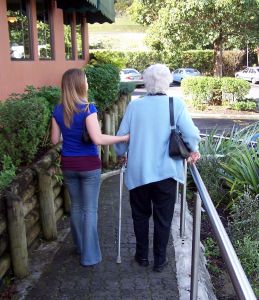At last, people with disabilities can expect support to live with all the rights of other Australians, in keeping with the UN Convention on Rights of People with Disabilities, ratified by Australia in 2008.
Now the rubber is hitting the road. The Commonwealth Government pledged $1 billion over four years in this year's budget to establish an agency to establish the NDIS and some test sites. State and territory governments are expected to contribute, which has caused problems for some states and provided opportunities for others.
Commonwealth-state relations are always untidy. We need to put politics aside and welcome the progress made, but accept that other jurisdictions will move towards the same goals in varying ways and at differing speeds.
Meanwhile, the National Disability Insurance Scheme Launch Transition Agency has been established and a CEO (David Bowen) appointed. What should happen now?
First, it has been accepted by all parties that the Commonwealth, states and territories all have a financing role for the NDIS. The Productivity Commission had recommended total Commonwealth funding. But the states already spend more than $4 billion on disability services; for an NDIS that will cost some $16 billion annually, this was impractical.
States' financing efforts are not all equal, and the Commonwealth has demanded that all states and territories match the highest per capita funder, Victoria. The detail will be worked out eventually, but the NDIS is to be a national effort, not just a Commonwealth one, just the same as Medicare is funded.
Second, administration is to be shared. Minister Macklin has said the Transition Agency will work with all jurisdictions. After the political bumps last week, we now have test sites across the country.
The Commonwealth needs to establish the policy framework for the NDIS, in particular an entitlement for all people with disabilities based on their need for assistance. It must establish an assessment system that will ensure an equitable system across the country to determine the amount of money people will receive to purchase assistance.
The states and territories are best placed to ensure services are on the ground for people to buy with their entitlement; that the services are of high quality, respect the rights of people with disabilities, and provide genuine choice. State and territory agencies such as the Department of Human Services in Victoria, Ageing, Disability and Home Care (ADHC) in NSW and the Disability Services Commission in WA now fund a wide range of services and have the skills and experience to ensure value-for-money services are in place.
Third, there needs be a national effort to increase the disability services workforce. That requires more educational places to train and re-train workers for the sector. It also requires proper pay, conditions and, crucially, respect for workers in the sector. The upgrading of salaries is underway, which will increase the cost of services. But there is little point in providing entitlement to support for people with disabilities if there are not the skilled workers to provide them.
Finally, the National Injury Insurance Scheme should be put on hold while the NDIS is established. People with disabilities due to injury should receive assistance on the same basis as other people with disabilities, on a no-fault basis and with no need to sue to receive compensation.
The separate National Injury Insurance Scheme proposed by the Productivity Commission was to be funded by the states and territories, as it would relieve existing injury compensation systems. This only made sense if the NDIS was to be totally funded by the Commonwealth. Two schemes would create boundaries, administrative expense and dispute. Existing compensation systems will need to adapt to the NDIS, and hopefully expensive and ineffective common law systems will be much diminished in this process.
People with disabilities, carers, families, and the broader community have a great expectation that a truly national NDIS is now coming. The NDIS will empower people with disabilities to take control of their own lives. It is crucial that all those involved stay focused on implementing the NDIS and avoid political point scoring while difficult financial and administrative issues are played out.
The NDIS is underway, and Australia will be a greater country for it.
- Suppliers
- New to MedicalSearch? Book a Demo
- Advertise with us
- Login
- Email Marketing
- Buyers
- Get Quotes
- Articles & Ideas
- Login
- Subscribe to newsletter
- My Details
- Get Quotes
- Accident & Emergency Care
- Aged Care & Disability
- Anaesthesia & Respiratory Care
- Beauty & Wellness
- Cardiology & Cardiac Surgery
- Commercial Cleaning & Laundry Supplies
- Dental Care & Oral Surgery
- Diagnostic Instruments & Medical Imaging
- Disinfection & Sterilisation
- ENT & Audiology
- Gynaecology & Obstetrics
- Homecare & Consumer Medical
- Hospital Equipment & Supplies
- Intensive Care Unit
- Laboratory & Pathology
- Medical Apparel
- Medical Devices & Products
- Medical Fridges & Freezers
- Medical Storage & Filing
- Medical Waste Management
- Optometry & Ophthalmology
- Orthopaedics & Podiatry
- Paediatrics & Neonatology
- Patient Monitoring & Management
- Physiotherapy & Rehabilitation
- PPE & Infection Control
- Single Use Medical Consumables
- Surgical Tools & Supplies
- Treatment Beds, Tables & Couches
- Veterinary Equipment
- Wheelchairs & Mobility Aids
- Get Quotes
- Accident & Emergency Care
- Aged Care & Disability
- Anaesthesia & Respiratory Care
- Beauty & Wellness
- Cardiology & Cardiac Surgery
- Commercial Cleaning & Laundry Supplies
- Dental Care & Oral Surgery
- Diagnostic Instruments & Medical Imaging
- Disinfection & Sterilisation
- ENT & Audiology
- Gynaecology & Obstetrics
- Homecare & Consumer Medical
- Hospital Equipment & Supplies
- Intensive Care Unit
- Laboratory & Pathology
- Medical Apparel
- Medical Devices & Products
- Medical Fridges & Freezers
- Medical Storage & Filing
- Medical Waste Management
- Optometry & Ophthalmology
- Orthopaedics & Podiatry
- Paediatrics & Neonatology
- Patient Monitoring & Management
- Physiotherapy & Rehabilitation
- PPE & Infection Control
- Single Use Medical Consumables
- Surgical Tools & Supplies
- Treatment Beds, Tables & Couches
- Veterinary Equipment
- Wheelchairs & Mobility Aids
Trusted by 740,000 Australian medical buyers
Buyers
- Discover products & solutions
- Login
- Subscribe To Newsletter
- Browse All Products
- Read Articles
Suppliers
Advertise
- Promote your products & solutions
- New to MedicalSearch? Book a Demo
- Login / Forgot Password
- Advertise Your Products
- Success Stories
- Email Marketing
- Suppliers
- Advertise with us
- Login
- Email Marketing
- Buyers
- Get Quotes
- Articles & Ideas
- Login
- Subscribe to newsletter
- My Details
Get Quotes
- Accident & Emergency Care
- Aged Care & Disability
- Anaesthesia & Respiratory Care
- Beauty & Wellness
- Cardiology & Cardiac Surgery
- Commercial Cleaning & Laundry Supplies
- Dental Care & Oral Surgery
- Diagnostic Instruments & Medical Imaging
- Disinfection & Sterilisation
- ENT & Audiology
- Gynaecology & Obstetrics
- Homecare & Consumer Medical
- Hospital Equipment & Supplies
- Intensive Care Unit
- Laboratory & Pathology
- Medical Apparel
- Medical Devices & Products
- Medical Fridges & Freezers
- Medical Storage & Filing
- Medical Waste Management
- Optometry & Ophthalmology
- Orthopaedics & Podiatry
- Paediatrics & Neonatology
- Patient Monitoring & Management
- Physiotherapy & Rehabilitation
- PPE & Infection Control
- Single Use Medical Consumables
- Surgical Tools & Supplies
- Treatment Beds, Tables & Couches
- Veterinary Equipment
- Wheelchairs & Mobility Aids
Get Quotes
- Accident & Emergency Care
- Aged Care & Disability
- Anaesthesia & Respiratory Care
- Beauty & Wellness
- Cardiology & Cardiac Surgery
- Commercial Cleaning & Laundry Supplies
- Dental Care & Oral Surgery
- Diagnostic Instruments & Medical Imaging
- Disinfection & Sterilisation
- ENT & Audiology
- Gynaecology & Obstetrics
- Homecare & Consumer Medical
- Hospital Equipment & Supplies
- Intensive Care Unit
- Laboratory & Pathology
- Medical Apparel
- Medical Devices & Products
- Medical Fridges & Freezers
- Medical Storage & Filing
- Medical Waste Management
- Optometry & Ophthalmology
- Orthopaedics & Podiatry
- Paediatrics & Neonatology
- Patient Monitoring & Management
- Physiotherapy & Rehabilitation
- PPE & Infection Control
- Single Use Medical Consumables
- Surgical Tools & Supplies
- Treatment Beds, Tables & Couches
- Veterinary Equipment
- Wheelchairs & Mobility Aids
Trusted by 740,000 Australian medical buyers






-160x160-state_article-rel-cat.png)












